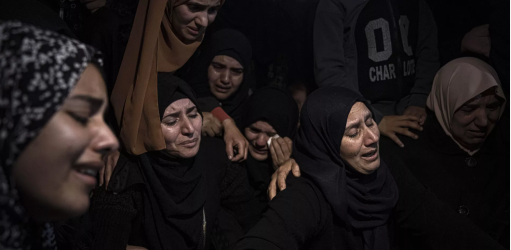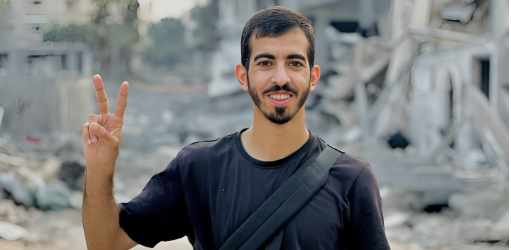This is a notification message.
 Abdullah Al-Nima... The main hall can accommodate 150 people
Abdullah Al-Nima... The main hall can accommodate 150 people
 The Nasser Al-Othman Hall can accommodate 70 people for lectures and workshops
The Nasser Al-Othman Hall can accommodate 70 people for lectures and workshops
 The Dr. Rabia Al-Kuwari Hall can accommodate 25 trainees for courses
The Dr. Rabia Al-Kuwari Hall can accommodate 25 trainees for courses
 The center's studio named after Abdulrahman Al-Maadadi
The center's studio named after Abdulrahman Al-Maadadi
The Qatar Press Center has named four of its halls after media pioneers to express its pride in their important contributions to the profession through their inspiring experiences in establishing and managing Qatari newspapers and expressing the issues of the nation and the Arab world through their articles, which document an important era in the history of the State of Qatar.
The QJC's Board of Directors approved the Director General's proposal to name the halls after Abdullah bin Hussein Al-Naama, Nasser bin Mohammed Al-Othman, Dr. Rabia bin Sabah bin Saeed Al-Kuwari, and Abdulrahman bin Saif Al-Maadadi, in recognition of their professional achievements.
Mr. Saad bin Mohammed Al-Rumaihi, Chairman of the Board of Directors, said: "This step comes from the Center's vision and mission to highlight the leading figures in the Qatari press, who have left an important mark in their commitment to professional ethics and in creating journalistic experiences that have continued to evolve and keep pace with the technology of news and report preparation, and publishing and printing, to become prominent figures in the history of Qatari journalism.
He added: "The Abdullah bin Hussein Al-Naama Hall is the main hall for the center's events and can accommodate up to 150 people, while the Nasser bin Mohammed Al-Othman Hall can accommodate 70 people for lectures and training and educational workshops. The Professor Rabia bin Sabah bin Saeed Al-Kuwari Hall can accommodate around 25 trainees in specialized courses in the fields of journalism and media. The center's studio has been named after Professor Abdulrahman bin Saif Al-Maadadi and will see the production of a number of specialized and documentary programs in the coming period.
For his part, Mr. Sadiq Mohammed Al-Amari, General Manager, said that the center is preparing to publish documentary books on the careers of these pioneers and other symbols of Qatari journalism, crowning their efforts and immortalizing the memory of those who have passed away, to serve as a reference for researchers and those interested in journalism and media, and to remind the new generation of journalists and media professionals of their vision, dedication and outstanding professional performance, which contributed to the advancement of the journalism profession throughout history.
Abdullah bin Hussein Al-Naama
He is the founder of Al-Arab newspaper and laid its foundations. He launched this ambitious project on March 6, 1972, thereby setting a roadmap for daily journalism in Qatar, which was followed by the publication of various daily, weekly, and monthly newspapers, including specialized publications.
The late Abdullah Al-Nama was born in October 1915 and died in 1995.
Al-Naama received his education in Qatar and Bahrain, and began his career at Saudi Aramco. In the 1950s, he moved to Kuwait, where he learned about printing and printing presses. He traveled to India to learn the basics of the printing profession, bought a semi-automatic printing press, and moved it to Qatar in 1957.
Al-Naama established the first bookstore for the distribution of Arabic and foreign newspapers and magazines, and published the first Qatari magazine, Al-Uruba, whose first issue was released on February 5, 1970. The magazine took a pan-Arab nationalist stance, It was published weekly with 48 pages and focused on local, regional, and international issues. It also highlighted the development pursued by the state. The magazine ceased publication in April 1996.
The wonderful reception of Al-Arouba magazine in various local circles prompted its owner to consider publishing a daily newspaper. Abdullah Al-Nima launched Al-Arab, the first Qatari newspaper, on March 6, 1972. It ceased publication in April 1996, a year after Abdullah Al-Nima's death, It resumed publication on November 18, 2007.
Nasser bin Mohammed Al-Othman
Dean of Qatari journalism, Nasser bin Mohammed Al-Othman Al-Fakhro (born 1939) was a member of the founding committee formed by the board of directors of the Gulf Publishing and Printing Corporation to establish the newspapers Gulf Times and Al-Raya. and the first editor-in-chief of Al-Raya, where he led the weekly publication from its first issue on May 10, 1979, and later led the daily publication from January 27, 1980.
He shared his experience on the last page of Al-Raya on January 27, 1980, writing: "Before I entered the field of journalism, I thought that what journalists wrote in their articles and said in their meetings about the hardships and problems of this profession and the continuous work and long hours it requires was an exaggeration. He added: “Here we are today, presenting the first issue of our daily publication in a new format and design, which I hope will appeal to our dear readers. I would like to mention that our daily issues are printed on our own presses, located in the industrial zone.”
On July 21, 1986, Nasser bin Mohammed Al-Othman resigned as editor-in-chief of Al-Raya, but on October 25, 1997, he returned to Al-Raya to take up the position of editor-in-chief. In November of the same year, he officially became editor-in-chief, a position he held until October 1999, earning him the title of Dean of Qatari Journalism.
As Al-Othman was the first editor-in-chief of Al-Raya, he was also the editor-in-chief of Al-Sharq newspaper, which was first published under the name Al-Khaleej Al-Youm on September 3, 1985, before returning as Al-Sharq as a weekly newspaper on September 1, 1987. It became a daily newspaper three months later, with Al-Othman taking over as editor-in-chief in 1989. He devoted all his experience to advancing the newspaper to the top position, and it became the first Arabic newspaper to publish an evening edition on the day of the invasion of Kuwait on August 2, 1990.
Mr. Nasser bin Mohammed Al-Othman Al-Fakhro was born in the Zakrit area in 1939. He began his primary education in 1949 and studied in Lebanon from 1952 to 1961, graduating from the International College in Beirut.
Al-Othman was involved in establishing the first radio station in Qatar, Al-Jami' Al-Kabeer Radio, in 1965. In 1970, he oversaw the first international book fair to be held in Qatar and was appointed a member of the founding committee of the Qatar National Museum in 1973.
He was the first Qatari journalist to be allowed to enter the Soviet Union in 1985. He was elected Secretary General of the Gulf Press Association in 2005. He was later elected to the Advisory Board of the Doha Center for Media Freedom, the only Qatari member of the ten-member board. Mr. Nasser bin Mohammed Al-Othman, Secretary General of the Gulf Press Union, won the Gulf Media Personality of the Year Award in 2012.
Al-Othman published the book “Al-Sawaed Al-Samar - The Story of Oil in Qatar” in 1980, as well as “Memories in Pictures” in 2022, published by Katara Publishing, which documents aspects of the lives of Qatar's prominent figures, landmarks and institutions.
Abdulrahman bin Saif Al-Maadadi
Professor Abdulrahman Al-Maadadi left a distinctive mark on Qatar's audio and print media. He served as Director of Qatar Radio from 1975 to 1995, during which time he devoted much effort, love and dedication to the station, leading efforts to improve and develop its content. He rose through the ranks to become Assistant Undersecretary for Radio and Television on September 28, 1992, and then Deputy Chairman of the Board of Directors of the General Authority for Radio and Television. He represented Qatar at many Gulf, Arab, and international conferences and was a well-known Qatari media figure in various Arab circles.
On April 11, 1992, he became editor-in-chief of Al-Julf Times. Al-Maadadi was a member of the board of directors of Dar Al-Khaleej for Publishing and Printing, succeeding his late brother Mohammed bin Saif Al-Maadadi. He also served as general editor of Al-Raya on October 31, 1999, in addition to his work as editor-in-chief of Al-Julf Times.
Al-Maadadi was generous, noble, gentle, and well-mannered. He had good relationships with everyone he worked with in various positions. He devoted his life to the media and was interested in, followed, and keen on development and innovation in all the positions he held.
Al-Maadadi trained at the British Broadcasting Corporation in London and was a keen traveler, having traveled extensively around the world. He was particularly fond of Southeast Asia, especially Japan, which he described as a country that embraces humanity.
Rabia bin Sabah bin Saeed Al-Kuwari
Dr. Rabia Al-Kuwari, a Qatari journalist, thinker, academic, and analyst, was born in 1962 in Doha, where he died in 2024. He was one of the founders of the Qatari daily newspaper Al-Sharq and one of its most prominent opinion writers.
Dr. Rabia is considered one of the most prominent academics and intellectuals in Qatar and the Arabian Gulf. He has a long history in journalism and had a weekly column in Al-Sharq newspaper entitled “Question Mark.” He was known for his sharp criticism and interest in issues of concern to the people, as well as his vision for the development of Arab and Gulf media and the preservation of cultural identity.
Dr. Rabia bin Sabah bin Saeed Al-Kuwari was educated in Doha schools and graduated from Qatar University in 1987 with a degree in media. He delivered the graduation speech for the tenth batch of graduates and obtained his master's and doctoral degrees in media from the University of Wales in the United Kingdom in 2001.
In the late 1970s, he worked for the Qatari newspaper Al-Raya and received his first financial reward from the newspaper's management after publishing a report on loans taken out by senior government officials, which encouraged him to pursue journalism and continue honing his skills through postgraduate studies.
In 1987, Al-Kuwari contributed to the founding of the Qatari newspaper Al-Sharq and took on the role of head of the local news department. He then worked as a teaching assistant at Qatar University. He had a weekly column in the same newspaper entitled “Question Mark,” in which he addressed issues of cultural identity in the Gulf, development, the homeland, salaries, citizens' concerns, and women's issues.
He loved folk heritage and published several books on the subject, as well as on genealogy, having collected folk proverbs, poems, and riddles since childhood. He authored numerous books on folk poetry in Qatar and published a study on the poet Muhammad Al-Fayhani. which collected his poems and articles written about him. He also authored the Encyclopedia of Popular Proverbs in Qatar, which contains thousands of proverbs commonly used in the country, as well as a dictionary of popular expressions, idioms, and sayings, which differ from proverbs and are divided into three volumes. He was appointed a member of the Board of Directors of the Qatar Press Center since its establishment in December 2017 until his death, may God have mercy on him, on March 14, 2024, at the age of 62.

تستقبل نساء غزة يوم الأم...

تواصل الآلة الإعلامية الإسرائيلية حربها...